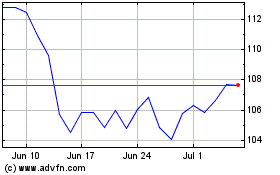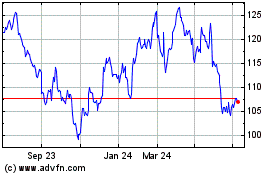Volkswagen to Use Greener Engine Technologies for Car Cargo Ships
November 21 2019 - 6:27AM
Dow Jones News
By Maitane Sardon
Volkswagen AG's (VOW.XE) logistics brand is exploring more
sustainable engine technologies and fuels for its overseas cargo
ships.
Last Friday, the company launched two car freighters powered by
liquefied natural gas from Xiamen, a port city in southern China.
The ships, Volkswagen said, are equipped with dual fuel engines
that can refuel liquid and gaseous fuels and will replace from
January 2020 two oil-powered cargo ships that the group logistics
currently uses on the Atlantic between Europe and North
America.
The move, Volkswagen said, is part of its goal to reduce its
carbon dioxide emissions, as engines that are powered by liquefied
natural gas can reduce the amount of CO2 emitted by up to 25%. The
company said it is planning to introduce more sustainable car
freighters over the next few years.
However, some experts said Volkswagen's choice of LNG to power
its freighters is not the most sustainable option, as the
spark-ignited internal combustion engine will release other
greenhouse gases such as methane, a big contributor to climate
change. Although carbon-dioxide emissions are the primary driver of
climate change, methane is about 25 times more potent than CO2 in
trapping the earth's heat, according to estimates used by the U.S.
Environmental Protection Agency.
"Switching to liquefied natural gas is a step in the wrong
direction" said Faig Abbasov, shipping manager at Transport &
Environment, a research and advocacy group.
Mr. Abbasov said a better option would have been the use of
clean marine diesel as a short term solution before completely
switching to ammonia, a carbon-free fuel that has a lower
combustion temperature and only emits nitrogen and water. He added,
however, that alternative fuels like clean marine diesel or ammonia
are more expensive than liquefied natural gas.
Volkswagen said its choice of natural gas is an intermediate
step in its goal to reduce its environmental impact. "Volkswagen is
aware that this is not the last step. We want to be prepared when
environmentally better fuels, like fuels with lower emissions than
LNG or conventional marine diesel, are available," said a
Volkswagen spokesperson, adding that ammonia was not the subject of
the investigations in the project, which started more than two
years ago.
Write to Maitane Sardon at maitane.sardon@wsj.com
(END) Dow Jones Newswires
November 21, 2019 06:12 ET (11:12 GMT)
Copyright (c) 2019 Dow Jones & Company, Inc.
Volkswagen (TG:VOW3)
Historical Stock Chart
From Mar 2024 to Apr 2024

Volkswagen (TG:VOW3)
Historical Stock Chart
From Apr 2023 to Apr 2024
